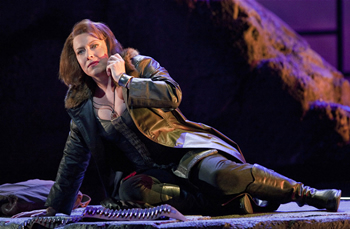On World Theatre Day, Meredith College’s playwriting class hosted Women at Work, a festival of one-scene plays written and read non-staged by students. Director Emily Johns announced “adult themes and strong language” at the beginning of the evening, signaling that these would be plays to make us think. The message for this year’s World Theatre Day, written by Krzysztof Warlikowski, reminds us of playwrights who seek out volatile and conflicting emotions in society and seek to bring them into full view in the theatre. He writes, “There is nothing that can reveal hidden passions better than the theatre.” This past Friday, the women of Women at Work presented nearly every hidden passion a woman could have.
The seven plays varied widely in subject and scope, but all highlighted several women’s issues: overthinking, pregnancy and abortion, rape and abuse, sex, relationships, and even the menstrual cycle. They were read from scripts by actors in chairs on stage, aided by Sarah Al-Sammak reading the stage directions. Not all of the acting came across as powerfully as it might with scenes and sets, but the actors did their best to give the plays a chance to shine. Most notably, Elaina Mittleman, Kat Myers, and “token” male actor Ryan Miller gave excellent performances of vastly different — and difficult to play — characters. Technically speaking, it would have been nice to hear a little bit more clarity in stage directions, and see the actors give at least a little bow or recognition at the end of each scene, but the format of reading instead of performing may have changed the director’s interpretation. Overall, the acting was decent, if not superb, and the writing was great.
Barbara Markow’s “Gotta Keep in Shape” details a woman (Mittleman) stressing out in the middle of the night, having imaginary conversations with her mother with dementia, and trying to talk her way out of insomnia. This stream-of-consciousness monologue referred to how difficult it can be for a woman to maintain physical, mental, and spiritual health while dealing with family issues — and barking dogs in the middle of the night.
“Choices” by M’Beyanna Robinson starts much differently, with a girl calling her mother to describe a college tour, until we learn that she is actually in an abortion clinic. Sohini Mukhopadhyay plays a seventeen-year-old weighing her options and talking the ear off everyone she meets in the clinic, including her mother (Maggie Mauney), her disillusioned nurse (Caroline Bass), and an escort she meets in the waiting room (Myers). The discussions were legitimate and critical, but the tone was seemingly light and breezy for contemplating abortion, STDs, and death. It could be that the emotions were difficult to capture in a ten-minute scene, and it only left room for the dialogue.
Perhaps the most confusing of the plays, “Serendipity” by Michaela Rose presents two sisters (Taylor Pearce and Caroline Bass) meeting in a cafe to catch up after years of separation and lost contact — only the years between high school and adulthood, but the women seem to have become strangers, even though we find out that they are twins. Without plot spoilers, they share their lives, total opposites growing more and more angry, only to find that they can really help each other grow up because of it.
Mittleman’s play “The Mourning After” opens on a pair of lovers finishing up sex. They talk about their plans — for the weekend, the next year, a vacation in the future — and end up learning how different they are. The flaky boyfriend (Miller) doesn’t seem to have any direction, but simultaneously has control over his hard-working girlfriend (Myers), who has big dreams and plans but can’t seem to reach them. This play resonated with many real relationships I have seen and experienced, touching on how a woman can be emotionally and sometimes even physically controlled by a lover who doesn’t seem to understand what she really needs most.
“Shades of Pain” by Teia Coley takes angry feminist stereotypes to a new level, opening on a frat boy (Miller) trying to get the number of a bitter feminist (Pearce) he meets at a bus stop. After finally getting her to open up, he learns that she has much more reason to shut herself down to men than he assumes, and they start a dialogue about what it feels like to live as a victim, or as a man whom women see as a possible aggressor.
By far the most enjoyable play of the night was Sarah Koop’s “The Visit,” in which a young woman (Mauney) getting ready for a date with a long-term boyfriend (Miller) is suddenly visited by her Aunt Flo (Mittleman), representing her period. Flo is personified as a crazy aunt — with a dead-on Minnesota warble — trying to celebrate her niece growing up. They farcically discuss sexual health, relationships, and what it means to accept the mensis as a part of life that can actually be a comfort. Even down to the stage directions, which point out distinctly, symbolically, white things versus red things, and physical comedy, this play was written almost perfectly.
The final play, “Normal” by Karyn Raynor, is much heavier, depicting the age-old struggle of having a college roommate and learning to overcome personal differences to live together. Unfortunately, conservative Christian Anna (Mittleman) walks in on the angry libertarian feminist Lily (Myers) pleasuring herself, and dialogue about privacy, sexual health, birth control, religion and atheism, Burning Man, and sexuality ensues. The writing and acting were visceral and heart-wrenching, but right on the money with how this situation would play out in real life.
The plays ranged from hard-hitting to satirical to light, but all presented ideas that can be difficult to swallow. The safe environment of an all-women’s college celebrating all women playwrights was a great chance for young writers and performers to explore these ideas, and serve to underscore Meredith College’s marketing campaign launched this year, “Going Strong.”












